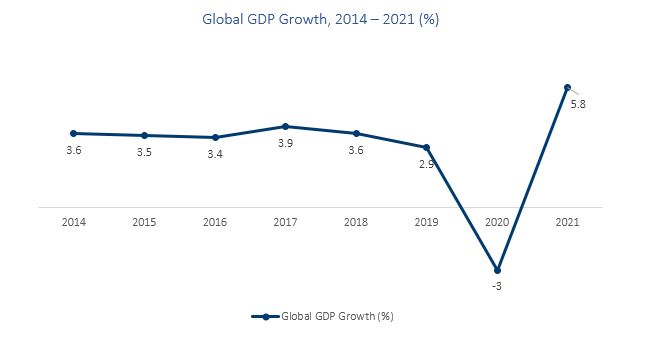What’s next
The petrochemical industry, which is a vital organ of the global manufacturing supply chain has found itself in an unfavourable situation in the past. In the wake of the widespread coronavirus, the problems have amplified. Earlier, the nature of the problem mainly concerned with feedstock supply or trade decisions. The nature of the problem is different this time cause it has impacted the global economy and has sent feedstock prices into an uncontrollable frenzy.
Global Economy
The global economy has been in freefall since the start of the pandemic. If the current situation persists, we could also witness a global recession with a slow recovery. The lockdown measure taken by governments globally is one of a kind in modern history. The nature of implementation has also played an important role in disrupting demand. Initially, it was assumed that stimulus packages government would provide a much-needed breather to the market. It has not been the case in China which is one of the largest importers and exporter of petrochemicals globally. To date, the fiscal measure introduced has not provided any momentum or resistance to the market. It is expected that the demand for petrochemicals will decrease by around 20% by the end of the year.

Before the arrival of corona virus, analysts predicted that petrochemical demand would take off in 2020 along with increased demand for feed stocks. With this intent, a large number of companies invested in capital expansions. It was estimated that the plastics circularity will provide a boost to the downstream industry. The presence of a large number of companies within the market space was expected to boost industry growth. Manufacturers have now halted capital expansion projects and plastics circularity is not the current priority. Recycling efforts which were expected to be one of the key areas of focus
Volatile feedstock prices
Amid the ongoing coronavirus, crude oil prices crashed to sub-zero levels. Weak economic growth coupled with high oil supply was responsible for the downturn. A similar trend was witnessed in refinery products such as plastic due to a sharp disruption in demand patterns in the automobile and transportation sector. However, natural gas supplies are expected to remain robust in North America. The major concern in the market is the liquidity status of a large number of crude oil buyers. The fall in crude oil prices overnight changed the profitability and operating cost of a large number of petrochemical companies.
Road Ahead
In the medium-term, manufacturers will look to handle inventory levels by keeping capital expenditures to a minimum. The labour restrictions will limit the scope of work undertaken. The industry could receive a boost if there are no unplanned interruption from here ahead. Manufacturers will now adopt a product-specific strategy to balance revenue disruption. The product mix of a large number of companies could take a different shape in the wake of the changing demand patterns. Renewable fuels which were earlier considered a possibility will now be in the backseat as crude oil trades at a minimum. Currently, the human aspect associated with the pandemic has been in focus but companies need to have strong strategies in place to get through uncharted territories.

